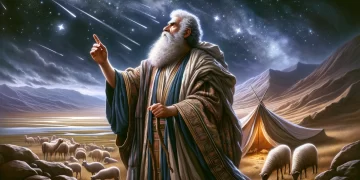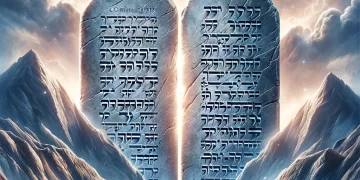Views: 2
Date of Events & Date of Writing & Primary Audience
- Date of Events: The events of Genesis 25:19-34 and 27:1-28:22, describing the lives of Jacob and Esau, are traditionally placed around 2000-1900 BC.
- Date of Writing: The Book of Genesis is traditionally attributed to Moses and is believed to have been written around 1446-1406 BC during the Israelites’ exodus from Egypt.
- Primary Audience: The primary audience was the Israelites, providing them with foundational stories about their ancestors and emphasizing the themes of divine election and covenant promises.
Story Summary
- Summary: Genesis 25:19-34 recounts the birth of Jacob and Esau, highlighting the prophecy about their futures and Esau’s selling of his birthright. Genesis 27:1-28:22 details Jacob’s deception to receive Isaac’s blessing meant for Esau, his subsequent flight to Haran, and his vision of the ladder to heaven.
Story Background
- Background: These narratives follow the covenant promises made to Abraham and Isaac, focusing on the next generation. The stories illustrate the complex dynamics of divine sovereignty, human action, and the unfolding of God’s plan.
Story Highlights
- Highlights:
- Birth of Jacob and Esau: Rebekah receives a prophecy about her twins (“Two nations are in your womb, and two peoples from within you will be separated; one people will be stronger than the other, and the older will serve the younger”).
- Esau Sells His Birthright: Esau despises his birthright and sells it to Jacob for a meal (“Look, I am about to die… What good is the birthright to me?”).
- Jacob Deceives Isaac: Jacob, with Rebekah’s help, deceives Isaac to receive the blessing meant for Esau (“The voice is the voice of Jacob, but the hands are the hands of Esau”).
- Jacob’s Ladder: Jacob dreams of a ladder reaching to heaven and receives God’s promise (“I am with you and will watch over you wherever you go”).
Story Purpose
- Purpose: To demonstrate God’s sovereignty in choosing Jacob over Esau, to highlight the consequences of deceit and favoritism, and to underscore the importance of divine blessing and covenant promises.
Story Theme
- Theme: The themes include divine election, blessing, deception, conflict, and God’s faithfulness.
Jesus Connection
- Jesus Connection: Jacob’s ladder is seen as a type of Christ, the bridge between heaven and earth (John 1:51). The story also foreshadows the transformative power of God’s grace, seen in Jesus’ redemptive work.
Kingdom Connection
- Kingdom Connection: These narratives illustrate the complexities of human behavior within God’s sovereign plan, emphasizing that the establishment of God’s Kingdom often involves unexpected and imperfect people.
Archaeology or Scientific Discovery
- Archaeology/Scientific Discovery: While direct evidence for Jacob and Esau is not available, findings related to ancient Near Eastern customs provide context for understanding birthright and blessing practices.
Hebrew Meanings of the Keywords
- Keywords:
- “Yaakov” (יַעֲקֹב) – “Jacob,” meaning “he grasps the heel” or “supplanter,” reflecting Jacob’s role in supplanting Esau.
- “Esav” (עֵשָׂו) – “Esau,” meaning “hairy,” describing his physical appearance at birth.
- “Bekorah” (בְּכֹרָה) – “Birthright,” referring to the firstborn’s inheritance rights.
- “Brachah” (בְּרָכָה) – “Blessing,” indicating the divine favor Isaac intended for Esau but given to Jacob.
- “Sulam” (סֻלָּם) – “Ladder,” representing the connection between heaven and earth in Jacob’s dream.
Kingdom Teaching(s)
- Kingdom Teaching(s):
- Divine Sovereignty and Human Action: The story highlights God’s sovereign choice of Jacob and how human actions, even deceitful ones, are woven into the divine plan.
- Importance of Blessing: The emphasis on Isaac’s blessing underscores the value of spiritual inheritance and God’s promises in the Kingdom.
- Transformation and Grace: Jacob’s journey from deceit to becoming Israel reflects the transformative power of God’s grace, pivotal in the Kingdom narrative.
By examining the story of Jacob and Esau through these various lenses, we gain a comprehensive understanding of divine election, the value of blessings, and the transformative journey within the framework of God’s Kingdom.
![Jacob and Esau [Genesis 25:19-34; 27:1-28:22]](https://kingj.tv/wp-content/uploads/2024/04/Jacob-and-Esau-in-Genesis-25_19-34-and-27_1-28_22-1140x570.webp)


![Creation of the World [Genesis 1:1-2:3]](https://kingj.tv/wp-content/uploads/2024/05/DALL·E-2024-06-01-23.50.14-A-vibrant-and-majestic-landscape-format-image-depicting-the-Genesis-story-of-the-Creation-of-the-World-360x180.webp)
![Isaac’s Birth and Sacrifice [Genesis 21:1-7; 22:1-18]](https://kingj.tv/wp-content/uploads/2024/04/Isaacs-birth-and-sacrifice-from-Genesis-21_1-7-22_1-18-360x180.webp)
![Cain and Abel [Genesis 4:1-16]](https://kingj.tv/wp-content/uploads/2024/04/Genesis-story-of-Cain-and-Abel-360x180.webp)





